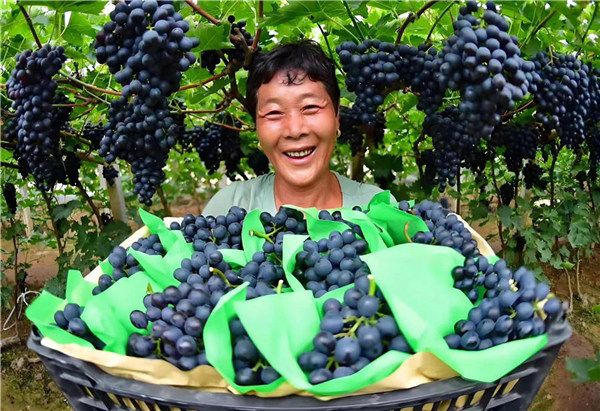Blossoming grape harvests in Xizang drive rural vitalization


In the picturesque Sangri county of Lhokha at Xizang autonomous region, perched at an average altitude of 3,600 meters, a flourishing grape cultivation sector is not only rewriting the narrative of agricultural modernization, but also emerging as a pivotal catalyst for rural vitalization.
Since 2011, leveraging the unparalleled geographical and climatic conditions of the Yarlung Zangbo River valley, Sangri embarked on the establishment of a high-altitude grape base.
This initiative — a collaborative effort between the county government, enterprises and support from researchers aiding Xizang — commenced with a grape trial harvest in the county's Tharma village.
By 2014, the county's grape project was operational, and today Sangri boasts a total grape cultivation area of 566 hectares. Projections for 2024 point to an expected grape yield of 3,400 metric tons and 1.13 million bottles of wine, with a total grape industry value of 229 million yuan ($319,000).
Yang Cheng, a sales manager at Rongshun Pazu Manor Co Ltd, a company dedicated to grape plantation and wine production, highlighted the advantages and challenges of grape cultivation in a plateau region.
"The abundance of sunlight, significant day-night temperature differentials, dry climate and heat-retaining soil favor grape growth. However, the high altitude and historical occurrences of adverse weather like sandstorms and hail present obstacles to the grape industry," said Yang.
Established in 2017, Yang's company has integrated grape planting, fermentation, exhibitions and vineyard tourism. With a fruiting area of 267 hectares, they have harvested more than 1,000 tons of grapes and produced 667,000 bottles of wine.
Winemaker Li Xiaoping introduced the estate's array of wines, including dry white, dry red, semisweet, sweet and ice wine, all receiving accolades from international industry publications.
Beyond economic gains, the genesis of ultra-high-altitude grape planting bases has yielded social and ecological benefits. The grape wine industry has provided training to 625 households and nearly 2,000 individuals from 10 surrounding villages, offering 60 types of jobs and boosting local incomes. Furthermore, it has spurred the development of agritainment, grape sightseeing and picking tourism.
Chodron, a 23-year-old college graduate from the county's Rong township, shared her transformative experience. Initially driven by curiosity, she discovered the intricacies and challenges of agricultural work, gaining a profound appreciation for the efforts and responsibilities of farmers.
Her aspirations now include fostering the local grape industry, expanding market reach, contributing to the economy and realizing her dream of becoming a vintner, all while showcasing the exquisite flavors of the highland sun to broader audiences.
"From nurturing seedlings to daily tasks like fertilizing, watering, weeding, harvesting and subsequent processing, each step requires meticulous care, consuming significant time and energy," said Chodron.
"I hope to develop the grape industry with local villagers in the future, promote the region's quality products to larger markets, contribute more to the local economy and eventually become a winemaker.
"My dream is to grow the best grapes in my hometown, produce the finest wine and allow more people to savor the taste of the highland sun."




































